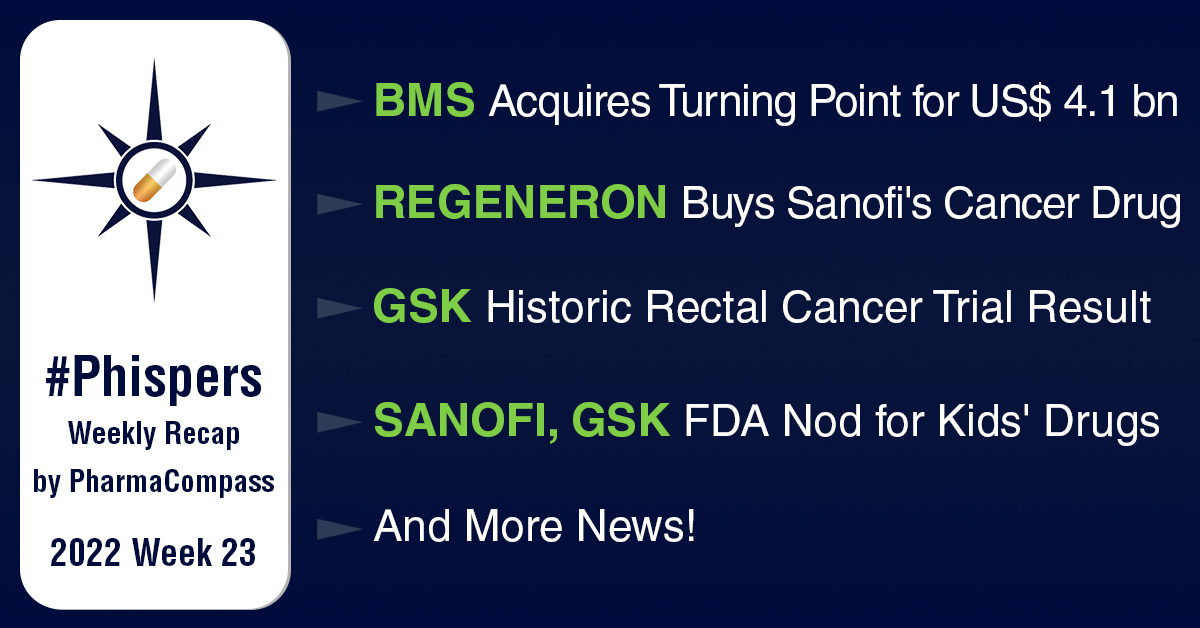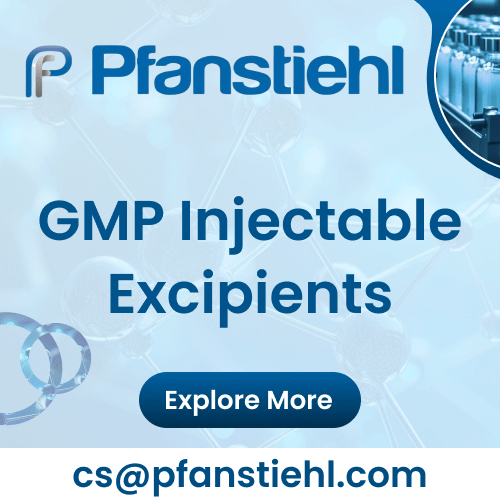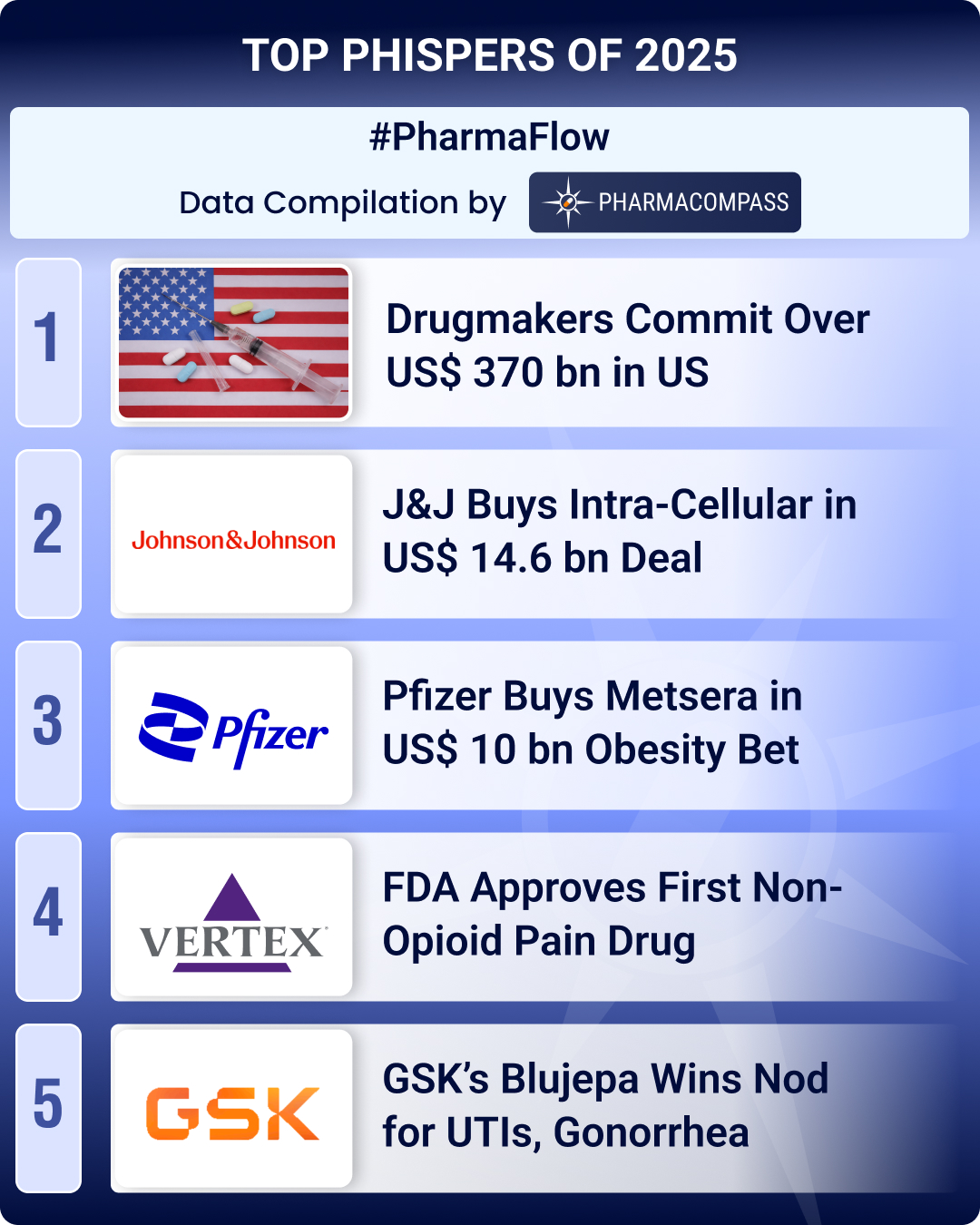
By PharmaCompass
2022-06-09
Impressions: 903 Article
Bristol Myers Squibb (BMS) is acquiring California-based drug developer Turning Point Therapeutics for an upfront cash payment of US$ 4.1 billion in order to boost its cancer drugs pipeline. BMS has also expanded its research partnership with immunotherapy drug discovery biotech — Immatics.
In oncology news, Roche’s Lunsumio (mosunetuzumab) won a conditional approval in Europe to treat follicular lymphoma patients who have received at least two prior therapies. And Regeneron Pharmaceuticals acquired global rights to cancer drug Libtayo from its French partner Sanofi by paying US$ 900 million.
This week’s Phispers also brings you news that in a small trial involving 12 rectal cancer patients, a GSK drug – Jemperli (dostarlimab) – has cleared every patient of their cancer with minimal side effects.
The US Food and Drug Administration (FDA) has approved GSK’s 25-year-old measles, mumps and rubella (MMR) vaccine – Priorix – for use in young children aged one year and above. The vaccine is already approved in over 100 countries. This is the first time in over 50 years that pediatricians in the US will have a new option.
Sanofi and Regeneron’s blockbuster drug Dupixent (dupilumab) bagged an FDA approval to treat eczema in young children. With this approval, Dupixent has become the first and only biologic medicine to treat moderate-to-severe eczema in young children between the ages of six months and five years.
A late-stage study of AstraZeneca and Daiichi Sankyo’s Enhertu showed that the drug extended survival by more than six months in patients with a form of advanced breast cancer. And an oral drug combination by Novartis has significantly improved the condition of patients suffering from a common childhood brain cancer in a trial. The drugs – Tafinlar and Mekinist – shrunk the tumors in 47 percent of patients.
In Covid-19 news, FDA’s vaccine advisory panel voted overwhelmingly to recommend authorization of Novavax’s Covid-19 vaccine for use in adults. If the FDA authorizes the shot, it will become the fourth Covid vaccine available for use in adults in the US.
BMS boosts its oncology pipeline with US$ 4.1 billion acquisition of Turning Point
Bristol Myers Squibb is acquiring California-based drug developer Turning Point Therapeutics for an upfront cash amount of US$ 4.1 billion to bolster its cancer drugs pipeline. The deal – at US$ 76 a share – will give BMS access to Turning Point’s star candidate, repotrectinib, that targets mutations in certain proteins in the body that lead to unchecked cell growth. The mid-stage drug candidate is undergoing trials to treat non-small cell lung cancer (NSCLC) along with other advanced solid tumors.
BMS expects repotrectinib to be approved in the US in the second half of 2023. It has hopes of the drug becoming a standard-of-care therapy for certain patients with NSCLC.
If approved, the drug will help BMS compete with Pfizer’s Xalkori and Roche’s Rozlytrek in ROS1-positive non-small cell lung cancer.
BMS-Immatics expand cell therapy partnership: BMS has expanded its research partnership with immunotherapy drug discovery biotech Immatics. As part of the revised deal, the two pharmas will develop two allogeneic off-the-shelf T cell receptor-based therapy (TCR-T) and/or chimeric antigen receptor T (CAR-T) programs owned by BMS. Both the companies have the option to develop four additional programs each.
BMS will pay US$ 60 million upfront to Immatics. The German-Houston company will also get up to US$ 700 million in milestone payments for each BMS program along with royalties. The expanded deal has raised the total partnership to US$ 4.2 billion.
Withdraws supplemental BLA for Reblozyl: BMS has withdrawn its supplemental biologics license application for Reblozyl (luspatercept) to treat anemia in adults with non-transfusion-dependent beta thalassemia. The pharma withdrew the application after it failed to answer FDA’s questions about the med’s benefit-risk profile based on phase 2 data. Reblozyl is already approved for transfusion-dependent anemia-associated beta thalassemia.
Roche’s Lunsumio bags conditional nod in EU to treat follicular lymphoma
The European Commission has granted conditional authorization to Roche’s Lunsumio (mosunetuzumab) to treat adult patients with relapsed or refractory follicular lymphoma who have received at least two prior therapies. With this authorization, Lunsumio has become the first CD20xCD3 bispecific antibody approved anywhere in the world.
Lunsumio is a new type of immunotherapy that is chemotherapy-free. It is an off-the-shelf fixed-duration treatment option that can provide an alternative to CAR-T therapies like Gilead’s Yescarta and Novartis’ Kymriah.
In a phase 1/2 study, the novel bispecific lymphoma drug reduced tumors in 80 percent of patients with heavily pre-treated follicular lymphoma. The drug showed a complete response rate of 60 percent and a median progression-free survival of around 18 months when used as a third-line or later therapy. Roche had submitted the drug to the FDA in December last year.
Regeneron to pay Sanofi US$ 900 million upfront for rights to cancer drug Libtayo
After partnering with Sanofi for seven years, Regeneron Pharmaceuticals has acquired the global rights to cancer drug Libtayo from the French drugmaker for an upfront payment of US$ 900 million. The two have been marketing the cancer drug in the US since 2015, while Sanofi used to market the drug in the rest of the world.
Regeneron’s chief executive Leonard Schleifer said the drug is a major step towards the company’s goal of becoming a global leader in the field of oncology.
As part of the deal, Sanofi will receive a royalty of 11 percent on worldwide net sales of Libtayo. It will get another US$ 100 million if the drug is approved in the US or in the European Union in combination with chemotherapy for non-small cell lung cancer (NSCLC) and another potential US$ 100 million in sales-related milestone payments over the next two years.
The drug is currently under review in the US and the EU for the treatment of advanced NSCLC in combination with chemotherapy. An FDA decision on Libtayo plus chemo combination as a first-line treatment for NSCLC is expected in September this year.
Small trial results in remission in every patient on GSK’s Jemperli
In a small trial involving around a dozen rectal cancer patients, a GSK experimental drug seems to have worked wonders, clearing every patient of their cancer with minimal side effects.
The drug – Jemperli (dostarlimab) – is an anti-PD-1 checkpoint inhibitor. It was administered every three weeks for six months to 12 people as a first-line treatment for a specific type of rectal cancer – mismatch repair-deficient stage II or III rectal adenocarcinoma.
The cancer vanished in all the patients, undetectable by physical exam, endoscopy, PET scans or MRI scans. No patients reported any clinically significant complications.
According to oncologists, a complete remission in every single patient is “unheard-of,” but it’s too early to be sure that the patients are cured. Jemperli, is already used to treat patients with endometrial cancer and costs US$ 11,000 per dose. The study was conducted at the Memorial Sloan Kettering Cancer Center in New York.
Astra’s Enhertu extends survival of advanced breast cancer patients by over six months
In a late-stage study, AstraZeneca and Daiichi Sankyo’s Enhertu extended survival by more than six months in patients with a form of advanced breast cancer. In the phase 3 study involving 550 patients, Enhertu reduced the risk of disease progression or death by 50 percent and the risk of death by 36 percent in patients with previously treated HER2-low metastatic breast cancer. The study, however, linked Enhertu to a type of lung scarring known as interstitial lung disease (ILD). Forty-five Enhertu patients in the trial had varying degrees of ILD versus one in the chemotherapy group.
Novartis’ drug combo helps in childhood brain cancer: An oral drug combination by Novartis has significantly improved the condition of patients suffering from a common childhood brain cancer. In the mid-stage trial, 47 percent patients on the two drugs – Tafinlar and Mekinist – saw their tumors shrink significantly, as compared to 11 percent patients whose tumor shrank in the standard chemotherapy study group.
The participants, aged between one year and 17 years, were suffering from low-grade gliomas (LGG), the most common childhood brain cancer. LGG is diagnosed in over 1,000 children in the US every year. The drug combination also caused far less severe side effects compared to chemotherapy.
GSK’s 25-year-old measles vaccine – Priorix – bags US approval
The FDA has approved British drugmaker GSK’s measles, mumps and rubella (MMR) vaccine – Priorix – for use in young children aged one year and above.
GSK’s widely licensed vaccine – already approved in more than 100 countries – will give pediatricians in the US a new option for the first time in over 50 years. Priorix has been in the market for 25 years.
The vaccine will be given as two doses – the first when children are between 12 to 15 months old and the second when they are between four and six years. The vaccine may also be given as a second shot to children who have been vaccinated earlier with a first dose of another MMR vaccine. Priorix will compete with Merck’s M-M-R II vaccine, becoming only the second MMR vaccine approved in the US.
Sanofi’s Dupixent becomes first drug to treat eczema in young children
Last month, Sanofi and Regeneron’s blockbuster drug Dupixent (dupilumab) received a nod from the FDA to treat eosinophilic esophagitis, becoming the first and only medicine to treat the disease.
This week, the drug has scored yet another first. The FDA has approved the use of Sanofi and Regeneron’s blockbuster drug Dupixent (dupilumab) to treat eczema in young children. With this approval, Dupixent has become the first and only biologic medicine to treat moderate-to-severe eczema in young children between the ages of six months and five years.
The approval for the drug is based on data from a late-stage study in which Dupixent improved skin clearance and reduced the severity of eczema when used with a corticosteroids cream.
Sanofi inaugurates new campus: Sanofi inaugurated its new campus at Cambridge, Massachusetts, this week. The campus – which is among Sanofi’s biggest US sites – consists of two buildings spread over 900,000 square feet. Sanofi aims to bring its 2,500 Massachusetts employees under one roof at the new integrated campus. The French pharma aims to boost collaboration between its research and development, medical and specialty care business units at the Cambridge Crossing site.
FDA advisory panel recommends Novavax’s Covid-19 vaccine for use in adults
The FDA's vaccine advisory panel has voted overwhelmingly in favor of recommending authorization of Novavax’s Covid-19 vaccine for use in adults. The panel voted 21-0 in favor of the vaccine for those 18 and older despite concerns that it may be linked to rare cases of heart inflammation. If the FDA authorizes the shot, it will become the fourth Covid vaccine available for use in adults in the US.
The Novavax vaccine is based on lab-grown viral proteins. The two-dose vaccine, given 21 days apart, is already available in over 40 countries. The drugmaker hopes that its vaccine will become an alternative for people still hesitant to go for mRNA vaccines by Pfizer and Moderna.
Recently, the FDA had flagged a possible risk of heart inflammation from Novavax’s vaccine. In Novavax’s trial conducted between December 2020 and September 2021, there were four cases of myocarditis, a type of heart inflammation, within 20 days of taking the shot.
J&J to end vaccine contract with Emergent: Last month, the FDA had limited the use of Johnson & Johnson’s Covid-19 vaccine due to safety concerns. This week, J&J said it has formally informed Emergent BioSolutions of its decision to terminate its agreement with the contract manufacturer for making its Covid-19 vaccine. Emergent, however, said J&J has breached the agreement by failing to buy the minimum quantity of vaccines made by the company. The contract manufacturer said J&J will have to pay between US$ 125 million and US$ 420 million if it terminates the Covid vaccine manufacturing contract. Last year, J&J had to throw away millions of doses of its Covid-19 vaccine produced at Emergent’s facility in Baltimore due to cross-contamination issues.
Meanwhile, Moderna has said a new version of its Covid-19 vaccine produced a better immune response against the Omicron variant of the virus compared to the original shot. The vaccine, which was given as a fourth dose in a trial that enrolled more than 800 people, raised virus-neutralizing antibodies by eight-fold against Omicron.
The PharmaCompass Newsletter – Sign Up, Stay Ahead
Feedback, help us to improve. Click here
Image Credit : Phisper Infographic by SCORR MARKETING & PharmaCompass is licensed under CC BY 2.0
“ The article is based on the information available in public and which the author believes to be true. The author is not disseminating any information, which the author believes or knows, is confidential or in conflict with the privacy of any person. The views expressed or information supplied through this article is mere opinion and observation of the author. The author does not intend to defame, insult or, cause loss or damage to anyone, in any manner, through this article.”







